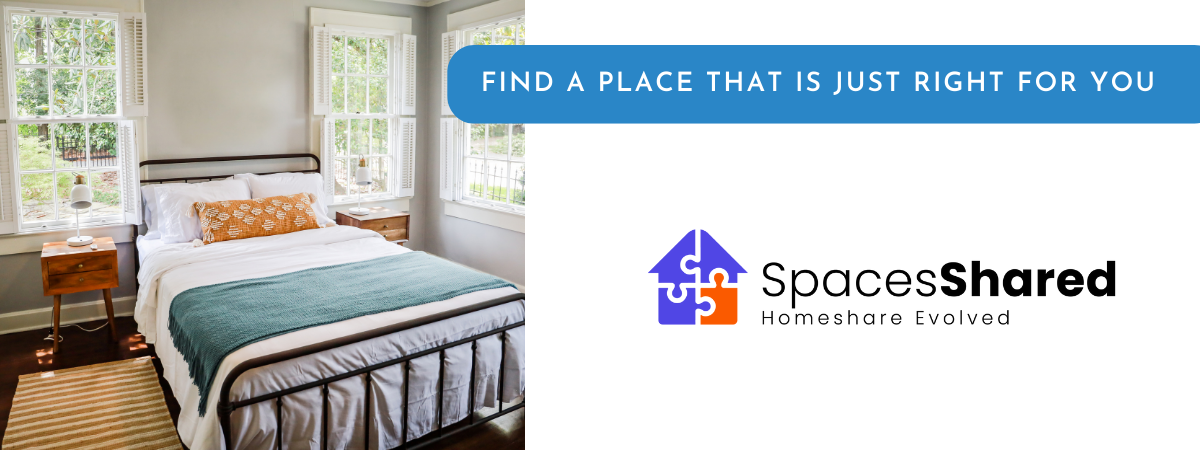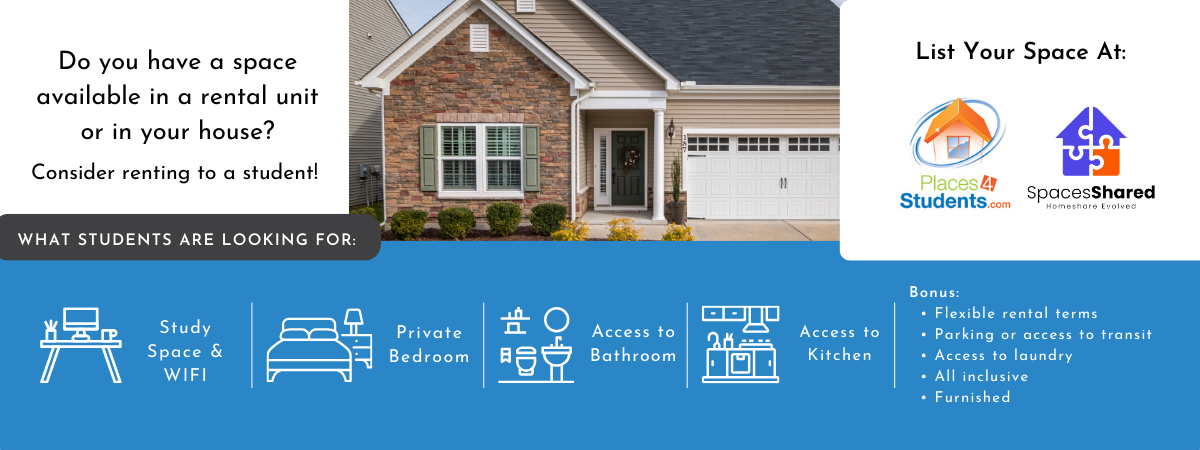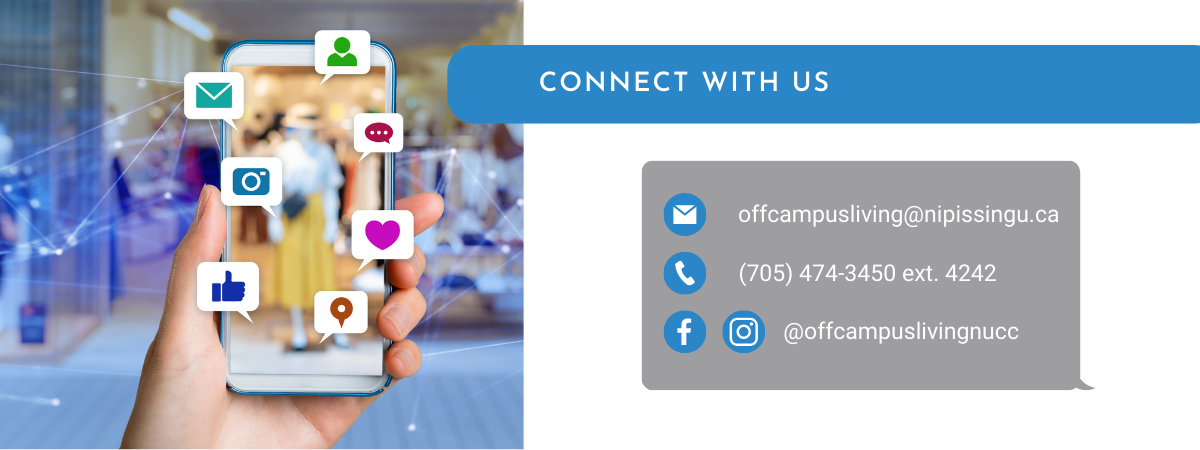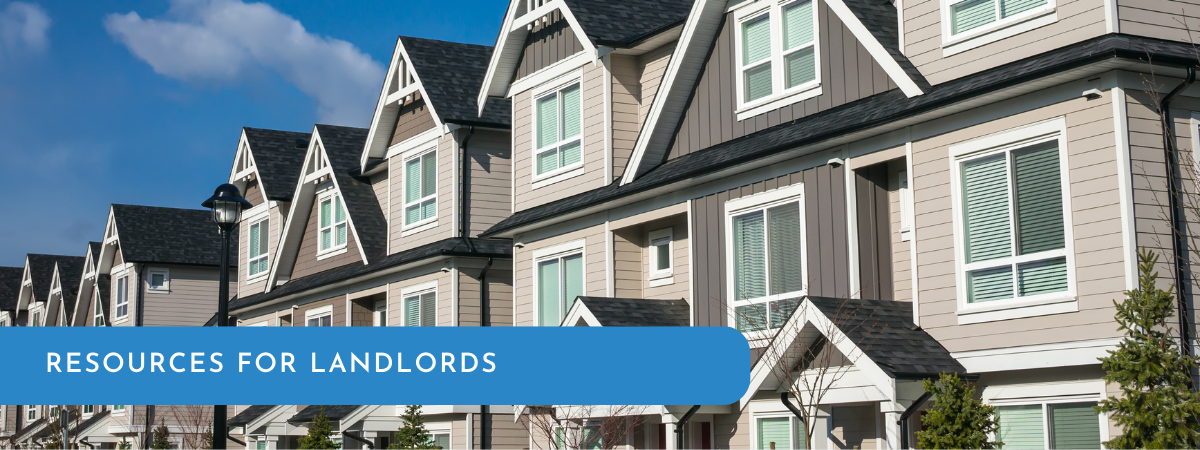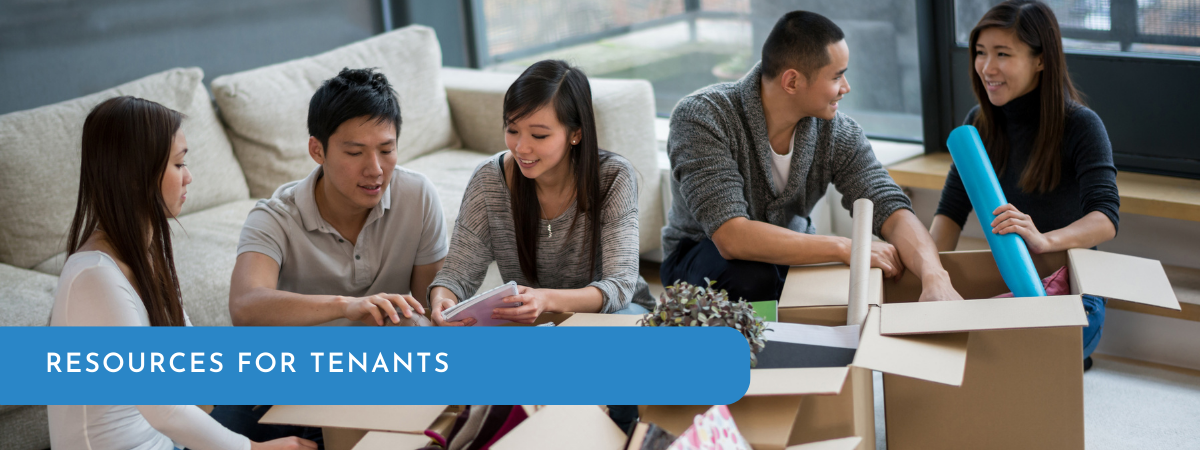
Nipissing University’s Off Campus Living Program is dedicated to providing students who choose to live off campus with the support and resources they need to become informed residents, promoting active participation in the community and on campus. By providing access to advertising websites, through Places4Students and SpacesShared, students have access to a variety of housing options to suit their specific needs.
Getting Started:
The search for a place to live should begin early as housing can be more difficult to find toward the end of the summer - we strongly encourage all students to search for housing early.
Contact Us:
Phone: 705-474-3450 ext. 4242
E-mail: offcampusliving@nipissingu.ca
Please note: the office of Off Campus Living is a virtual office.
Communication via phone or email is preferred and we will return your contact as soon as we are able.
Should you wish to meet in person, please email or call to set up an appointment.
- Rental Listings
- Resources for Student Renters
- Resources for Landlords
- Rental and Community Resources
- Frequently Asked Questions
Find a Place That is Just Right for You
Places4Students.com

Places4Students provides students, schools and landlords with a high quality, off-campus housing service. The website provides a large real-time database for student housing vacancies in our area, including photos and text, contact information and property features.
Contact:
Places4Students Customer Support Team:
- Phone: 1-866-766-0767 (toll-free in North America)
- Email: admin@places4students.com
SpacesShared.ca

SpacesShared is a homesharing technology platform that empowers two key groups to meet each other: older adults and students. Launched in 2023, SpacesShared is responding to the Canadian housing crisis with a solution that prioritizes connection, comfort, and community.
Students looking for a safe, affordable place to stay can now quickly and affordably connect with older adult hosts who would like some extra income, help around the house, and an opportunity to give back.
The platform is entirely self-contained from application, to agreement, rent and relationship management on its website. It’s a new way to honour an old tradition: opening homes to people and experiences that enrich lives and communities.
Looking for other rental search options?
Online Platforms: Search for rentals on Facebook Marketplace, Kijiji, or Airbnb.
Facebook Groups: Join local rental groups like North Bay Apartments For Rent or Nipissing University Off-Campus Rental Housing
Hotel Partnerships: We’ve partnered with local hotels offering short- and long-term accommodation. Consider sharing costs with a roommate. Contact hotels directly to secure a space.
Need more help? We provide education and resources, but it's up to each student to contact landlords and roommates for rental arrangements.
Housing Insecurity
Nipissing University recognizes that safe and accessible housing is a fundamental need and housing insecurity can impact students academic success. There are a variety of campus services that may be helpful to students navigating housing insecurity.
Student Financial Services
Students are encouraged to contact Financial Aid, at any time for support in determining what financial supports may be available to assist them in times of need.
Awards and Bursaries: Students in financial need may be eligible for some of the many different in-year bursaries and awards that are offered. Please make note of the deadline to apply each year.
Student Support Fund: Students who may face unexpected financial hardship are encouraged to apply to the Student Support Fund.
Access & Inclusion
For students seeking advocacy and equity support in relation to their current housing situation or in their effort to find housing, the university Access & Inclusion Coordinator is available to help identify options & possible supports. Please email sds@nipissingu.ca to be connected with the staff that can support you the best.
Emergency Housing
Students facing a housing emergency or immediate housing insecurity are encouraged to contact Off Campus Living (offcampusliving@nipissingu.ca) and Residence Life (residence@nipissingu.ca). Through the Residence Life department a number of emergency options may be available to students in need of housing support on a short term basis and/or who may be looking for housing for the remainder of their academic term.
Rental Search tips and Checklists
Safety tips
Renting in North Bay
Being a Good Tenant and Neighbour
Becoming a landlord can be a very rewarding and sometimes lucrative experience. It also comes with many responsibilities, which many people do not think of when they start. This resource section seeks to provide landlords with the information that will make their rental experience positive for themselves and their tenants.
Helpful Links
- Landlord and Tenant Board
- The Residential Tenancies Act
- Brochure: A Guide to the Residential Tenancies Act
- Brochure: Information for New Tenants (Landlord must provide this document to new tenants)
- Residential Tenancy Agreement (Standard Form of Lease)
- Renting in Ontario: Your rights
- CLEO: Community Legal Education Ontario
- Landlord Self-Help Centre
- Residential Rental Housing License
(North Bay By-law) - North Bay Good Neighbour Guide
- Hydro Home Assistance Program
- Ontario Energy Board Materials
- Accessible and Adaptable Housing
Emergency Numbers:
911
Ambulance, Fire, Police
705-472-1234
North Bay Police Services, non-emergency line
705-495-3878
Ontario Provincial Police, non-emergency line
Community Resources
| Name | Phone | Website | |
|---|---|---|---|
| AIDS Committee of North Bay and Area | 705-497-3560 | North Bay AIDS Committee | |
| Alcoholics Anonymous | 705-474-7940 | Alcoholics Anonymous Northeast Ontario | |
| Amelia Rising Sexual Assault Centre of Nipissing | 24-Hour Crisis Line: 705-476-3355 or Office: 705-840-2403 | info@ameliarising.ca | Amelia Rising |
| Arthritis Society, Northeast Region - Sudbury | 705-673-4641 | info@arthritis.ca | Arthritis Society, Northeast Region |
| Brain Injury Sudbury and District | 705-670-0200 | info@biasd.ca | Brain Injury Sudbury and District |
| Canadian Hearing Society | 1-866-518-0000 | info@chs.ca | Canadian Hearing Society |
| CNIB | 1-800-563-2642 | CNIB | |
| Crisis Centre North Bay | 24-Hour Crisis Line: 705-474-1031 | info@ccnorthbay.ca | Crisis Centre North Bay |
| Community Counselling Centre of Nipissing | 705-472-6515 | info@cccnip.com | Community Counselling Centre |
| Canada Drug Rehab | Help Line: 1-888-245-6887 | Canada Drug Rehab | |
| Multiple Sclerosis Society | 1-800-268-7582 | info@mssociety.ca | Multiple Sclerosis Society |
| Nipissing Community Legal Clinic | 705-476-6603 | Nipissing Community Legal Clinic | |
| Nipissing Mental Health Housing and Support Services | 705-476-4088 | ||
| North Bay Food Bank | 705-495-3290 | debbie@northbayfoodbank.ca | North Bay Food Bank |
| North Bay Indigenous Friendship Centre | 705-472-2811 | reception@nbifc.org | North Bay Indigenous Friendship Centre |
| North Bay, Parry Sound District Health Unit | 705-474-1400 | contact@healthunit.ca | NBPSD Health Unit |
North Bay Regional Health Centre | 705-474-8600 | North Bay Regional Health Centre | |
| Pain Management Clinic | 705-495-7960 or 705-474-8600, ext. 3850 | Pain Management Clinic |
Nipissing Resources
Campus Resources:
| Name | Phone | Website | |
|---|---|---|---|
Campus Security, On-Duty Officers 24/7 | Cell: 705-498-7244 or 705-471-2488 | Security | Nipissing University | |
| Campus Food Services | 705-474-7600 ext. 5413 | Dining on Campus | Nipissing University | |
| Campus Shop Bookstore | 705-474-7600 ext. 5347 | nipissingu@bkstr.com | The Campus Shop Apparel, Merchandise, & Gifts (bkstr.com) |
| Campus Health Centre | 705-474-7600 ext. 5261 | campushealthcentre | Campus Health Centre | Nipissing University |
Student Resources:
| Name | Phone | Website | |
|---|---|---|---|
| Student Union | ext. 4801 | communications@nusu.com | Student Union |
| NUSU Food Bank | NUSU Food Bank | ||
| Student Development and Services | sds@nipissingu.ca | Student Development and Services | |
| Financial Aid | ext. 4311 | finaid@nipissingu.ca | Student Financial Services |
| Enji giigdoyang Office of Indigenous Initiatives | ext. 4899 | indigenousprograms | Indigenous Initiatives |
How do I avoid and prevent rental fraud?
Rental fraud can happen anywhere to anyone. Being diligent is key to help in avoiding scams and fraud. There are two common types of rental fraud that affect both students and landlords: fraudulent rental properties and fraudulent renters looking for places to rent. Provided below is some information to help students identify aspects of rental fraud and precautions that should be taken to avoid becoming a victim.

